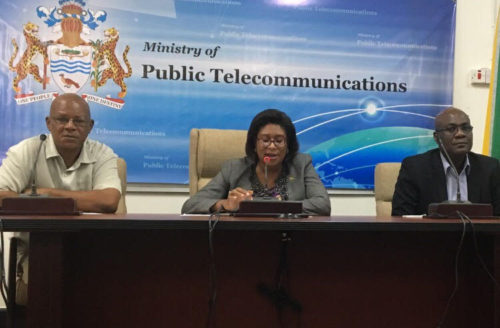The Ministry of Public Telecom-munications is working towards a July deadline for the liberalization of the telecommunications sector in Guyana, which would allow new players in and hopefully lower rates, according to Minister Catherine Hughes.
“It is a process. The most important thing was passing the legislation that would allow other parties to come into the market and to increase competition and our hope is that with increased competition, rates would go down,” the minister told reporters yesterday at the ministry’s mid-year press conference.
According to Hughes, negotiations are ongoing with both Atlantic TeleNetwork (ATN) and the Guyana Telephone and Telegraph (GTT) Company on the matter, “…We are working towards a July timeframe. Even if we miss it, I am hoping that before we get into the final quarter [of the year] we would have created an environment where more players come into the market.”
The ministry is also working on creating a new regulatory body, the Telecommunications Agency, that will manage the new environment, Hughes stated.

Meanwhile, providing an update on the Information and Communication Technology (ICT) programmes which have been rolled out across the country, the minister said that to date 16 ICT spaces have been completed and are fully in operation while another 30 are under construction. Hughes added that they have also identified 55 hubs to connect communities in the last ten months.
Additionally, Hughes stated that to date, 24 government ministries and agencies; 84 secondary institutions; 9 Technical, Vocational Education and Training (TVET) institutions; 5 regional offices; 21 tertiary education and training and skills institutions and 24 other skills institutions have been connected under the programme.
“We have put Guyana on the road to becoming a national digital economy. We have a lot of work to do but we are happy to say we are laying the… foundation…Our thrust is wanting Guyanese to understand this new digital age we are going into and the fact that it is not just talk, it is real,” the minister stated.
Presidential Advisor on e-Governance Floyd Levi also underscored the progress made with the programme, stating that the ministry is currently in the process of extending the network into the hinterland regions. “So far we have established seven areas in the hinterland where we have connected them with satellite-based internet systems. These areas include the Iwokrama research centre, Annai, Paramakatoi…” He added that the ministry has also worked with Digicel to extend the network in places where the telephone company is located and, “places we would like to be such as Mabaruma, Port Kaituma and Matthews Ridge.”
While government does not have capacity to manage all the hubs, Levi stated that training is being provided in the different communities and these communities will also determine policies on how to run the hubs.
Questioned about the effect the programme is having on service providers such as Digicel and GTT, Levi stated that the internet that is being provided to the various communities is being acquired from GTT in bulk. “The internet is being used by government offices during normal working hours. One can imagine when government closes for the day that this internet becomes dormant. So it is that spare internet capacity that we are now funneling to communities across Guyana so there is optimum utilization of the internet we are purchasing from GTT.”
Meanwhile, asked how soon the impact of the ICT hubs can be measured, Director of Project Management and Community Development Phillip Walcott said that at present the initial focus is on ensuring there is sufficient use in the communities. “We want to ensure we are not putting down white elephants and so we are actively working with those communities. For one reason or the other people think it is a government initiative. We are working to overcome such built-in resistance and promote use and once we create use we will create the impact,” he stated.
President David Granger had announced the initiative last year, stating, “I have committed myself that in the months to come, every person going into a public building, whether that building be as school or hospital, an airport that there will be Wi-Fi.” The initiative began at the Cyril Potter College of Education at Turkeyen and has been moving to schools across the country.
While an allocation of $1.58 billion was made in the 2017 budget for e-Governance initiatives, an estimated $114 million has been earmarked for the provision of public internet access at over 600 government buildings across the country.





